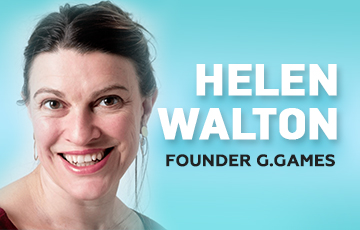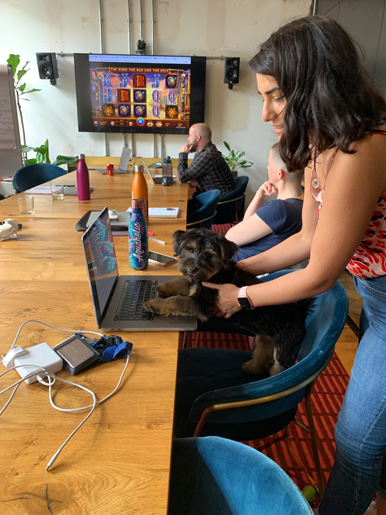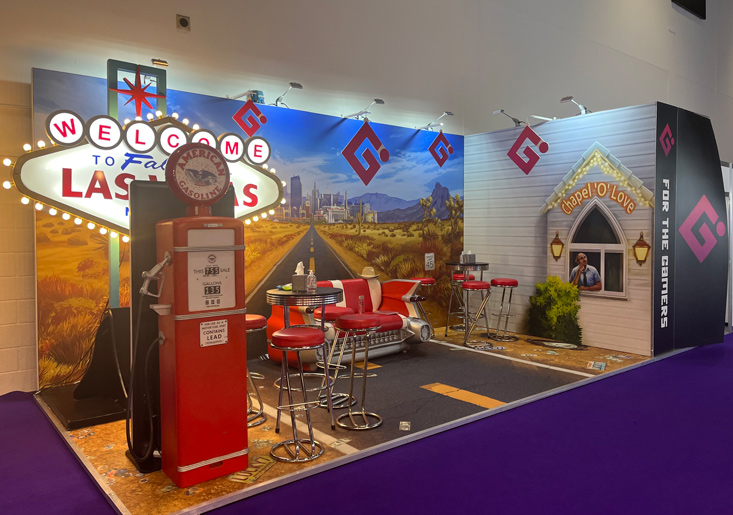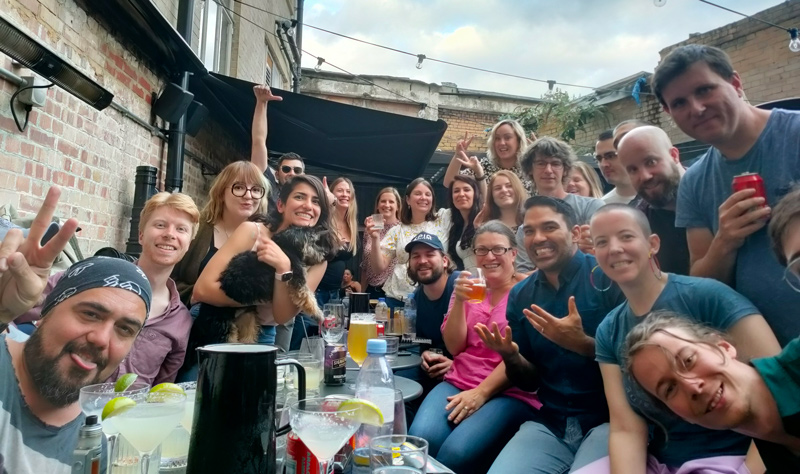«The hardest part of slot creation is getting a high quality launch to ensure a good trial of the product» ― the interview with the founder of G.Games company

Slotsandcasinos.org continues to communicate with interesting people about gambling and online casinos. This time we interviewed Helen Walton – the founder of one of the most unordinary G.Games providers. About gender issues in gambling, the algorithm for creating slot machines in the company and many other things the readers will know in this article!
― Hello, Helen! According to statistics, a third of gambling players are women. Does g.games take this into account when creating slots? If so, what are the specifics of releasing games for a female audience? How do such slots differ from “male” slots? More pink and glitter?
― I hate the «pinkification» way of trying to appeal to women ― it’s so patronising! More important is to make sure that the range in your portfolio does not exclude women. If all you offer are slots with anatomically incorrect women pouting while semi-naked, you shouldn’t be surprised if you end up with a more male base! Instead, make sure that themes, mechanics, bet sizes, promotions and marketing campaigns don’t accidentally exclude women.
― Despite so many women involved in gambling, iGaming is still considered a mostly male-dominated industry. Isn’t it difficult for you in such a responsible position? Have you ever felt any prejudice just because you are a woman?
― I honestly think that this is one of the most old-fashioned industries I have ever worked in in terms of its attitudes towards gender ― and I have worked in finance and technology! It is changing (slowly), but I still know far too many women in gaming who have had to put up with unprofessional comments or approaches. I’ve had people question my capabilities in finance or product design or assume that I’m not a Director and question whether I have responsibility to sign something off.
Having said which, of course, I can see attitudes developing and changing and it’s absolutely clear that a majority of people in the industry want to ensure it is seen as a modern workplace that is welcoming to and supportive of women. One of the good things about the industry is that I think it is more diverse than most in terms of social background and nationality – iGaming welcomes a range of people without degrees, for example, as well as being very global.
― You graduated from Cambridge and have a degree in English literature, also you worked on celebrity brands, created cosmetics, wrote articles. And suddenly you decided to open a studio for slot development. Why did you decide to change your business? Why did you choose gambling?
I met my co-founders when we all worked on a previous startup creating an education product on how to deliver large software projects more effectively. When that startup launched and succeeded, we were looking around for what to do next ― we decided to take on another challenge together. We were convinced that the idea of massive social games where people could win real-money prizes needed to be explored further and was ripe for innovation (we still think that!), ― the model where you pay to enter to win a prize is called gambling! As we’ve learned more about te sector, we’ve found ourselves creating a range of product from scratch cards to slots. But for us, it’s still about that original insight ― how do you help people do something fun that is also about dreaming of the big win?
― G.games creates interesting lotteries, not limited to beautifully drawn pictures. In your portfolio there are lotteries with arcade games where you have to shoot chickens, there are also cute scratch cards with unicorns and other non-standard games. Why did you decide to choose exactly this genre, as the most popular games are video slots and table games?
― We don’t lack slots or table games in our portfolio nowadays! Beneath everything we do though is a fascination with the everyday player ― what keeps a player entertained? what reassures them that they can trust the game they are playing? what can they dream about? what feels good about their play? And whether we’re producing a roulette wheel or a crazy battle game ― those questions lie at the heart of what we do.

― Tell us more about the process of creating a slot, start with the idea and finish with the product’s release to the market.
― Anyone at G can come up with an idea ― we’ve had developers and artists come up with game concepts as well as formal ‘game designers’ and producers. We don’t keep ‘creativity’ separated off into one area of the business. Every idea will have a business case built around it I order to prioritise the work. Once there’s capacity, work is picked from the queue and a team with artists, animators, technical artists and engineers will start working on it, led by a producer who has overall responsibility for seeing the game progress from lightbulb to live. We have demo and feedback sessions which sometimes involve players or operators as well in order to keep improving the game. Finally of course, a game is ready for certification and rollout into different jurisdictions and customers.
― On your LinkedIn page, it says that you’re involved in slot development and generating ideas to create them. What’s the hardest part of creating a slot: the technical part or finding a good idea?
― The hardest part of slot creation is getting a high quality launch to ensure good trial of the product. Players sometimes try what’s new, but they come back to what’s familiar. Much of whether a game is a success or not is part of a self-fulfilling prophecy about whether the casino believes it will be and so is willing to support it. When you’re trying to innovate the barriers are even higher ― you need to persuade regulators to approve the idea, casinos to support it and players to try it ― and you need to do all that without blowing your cost of production… no wonder there’s often so little innovation in slots!

― G.games has no managers. This is quite a non-standard policy, your employees probably feel like they are in paradise because nobody tells them how to work properly, nobody irritates and pressures them. But doesn’t it negatively affect the productivity, the goals and objectives of the company? What is the process like?
― We start from a basic assumption that most people are naturally motivated ― they want to be seen to do well, they want the approval of their peers and they want the inward satisfaction of feeling they’ve done a good job and the external validation of seeing the company succeed. Given that that really is the case for most people, the role of a boss is kind of redundant ― instead you need people to help with process coordination and collaboration so that people have the information and resources they need to make good decisions and produce quality work. None of that means we don’t have leadership roles or pressure or dissent! We try to make sure that we have a shared and open prioritisation method, for example, so that people understand what to work on and more importantly – why. It helps us avoid the HIPPO (highest paid person’s opinion)
― Your employees work remotely. Tell me please, how do you control them, how do you cope with difficulties?
― We only employ uncontrollable people 😉

― The Key difficulty with remote working is that you can feel emotionally as well as physically distant from someone to whom you mostly chat online rather than face-to-face. If there are some people who go into an office and others who don’t, it’s easy for cliques to form. But that happens everywhere. The trick is to find ways to keep people connected, from in-person retreats to regular communication, both formal and informal.
― What do you like more: slots or table games? Why? What is your favorite game?
― Personally 0 give me our Solitaire every time. I could happily waste a whole afternoon playing that game. In fact. I’m not allowed to demo it to customers anymore because I get lost playing the game!
― You have grown from a small studio to a big company with 75 employees in less than 10 years. Over 200 games have already been released. Market leaders like Microgaming, iSoftBet, Relax Gambling, Yggdrasil willingly cooperate with you. Was it difficult to earn the trust of such companies?
― Yes. Everyone wants to be your second customer. Getting that first customer live was the biggest hurdle ― a big thanks to Conleth Byrne at the Football Pools and David van Rosen at Lottoland who were the first people to really see what we were trying to do and give us a break.
― In one of your interviews you said that the most difficult thing was to stay in business in the first years of the company’s foundation. Did you have any thoughts of giving it all up? Can you share what helped you stay afloat?
― Oh god yes. Paul, Dan and I didn’t take a penny in salary for 5 long years. All three of us made sacrifices and so did our families: no holidays or presents, no ability to do work on the house, having to borrow from friends and family, adding to our own mortgage to pay the wage bill occasionally…. if we’d known how hard it was going to be I don’t think we’d have had the courage to start. But you can say that about most things in life you’re proud you’ve done, from writing a book to having a child. Knowing that all three of us were in together helped, but also just seeing our progress kept us hanging on.
― The g.games website mentioned that you are working on a great idea. Can you share the details?
― I want to. But I can’t or I’d have to kill you. It’s multiplayer ― and it’s awesome.
― Just imagine. How do you see the gambling industry in the distant future? For example, Elon Musk implanted a gaming chip into a monkey’s brain to allow the monkey to use gadgets just with mind. Do you think that in 20 years we will be gambling online “telepathically”?
― I think we can’t even imagine what the next generation of games will be. Who’d have thought that the poker card machines introduced at the end of the 19th century would turn into the global slots industry we see today?
― In one interview you called yourself “the only hippies in the gambling industry. What did you mean by that?
― At the very beginning, a much bigger company, annoyed at how we were talking about no bosses and open information, called us ‘a bunch of over-ambitious hippies’. I thought it was pretty accurate and I’ve used it ever since!
― You manage to produce two slots a month with a staff of 75 people. The giants of the industry would be jealous of such productivity. How do you manage to produce a quality product in a short time?
― Technical frameworks and necessity! If a task is tiresome, we automate it – that leaves our people free to concentrate on the stuff that matters.
― Thank you for interesting answers!


